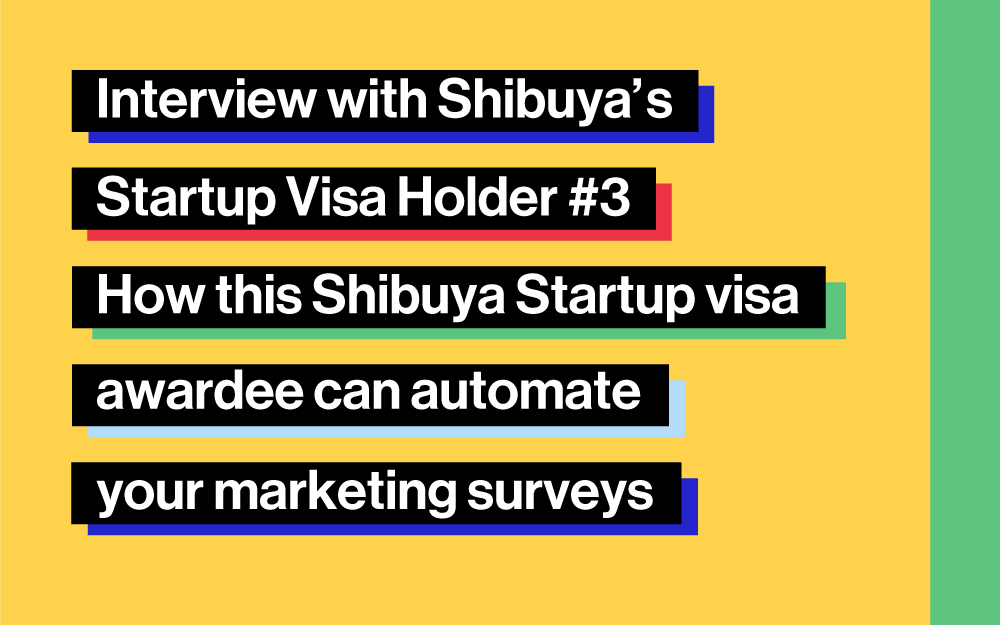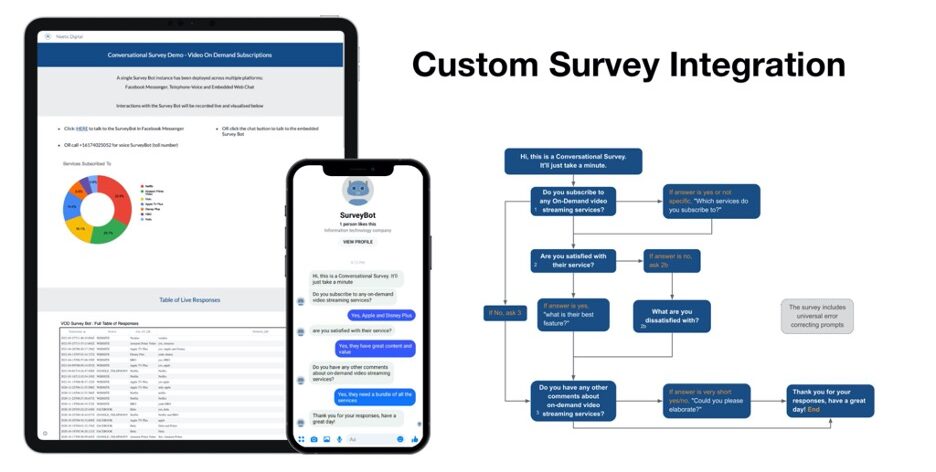


このシリーズでは、当社のコミュニケーションアドバイザーであるサシャ・カヴェリーナが、スタートアップビザの申請に成功した起業家たちへのインタビューを通じて、渋谷のスタートアップ創業者についてご紹介します。彼らのストーリーから、渋谷を選んだ理由やスタートアップビザ申請のコツまで、詳しくお伝えします。手作業で顧客のインサイトを集める時代は、すぐに過去のものとなるでしょう。ジョージ・Noetic Digitalの創業者で渋谷スタートアップビザ保持者であるジョージは、現在、企業がアンケートを自動化するためのシンプルで効果的なシステムを開発しています。

こんにちは、ジョージ!起業家としての道のりについて教えてください。
私は数年間、さまざまな分野に深く取り組んできました。世界がどこへ向かっているのか、そしてその過程で何を学ぶべきかを探求してきました。オーストラリアの大学でITとコンピュータサイエンスを学び、大手企業で働きながら、ソフトウェアプラットフォームの開発に必要な技術力を身につけました。
シンガポールの最大手REIT企業でインターンを経験し、香港のシティ大学で留学交換プログラムに参加。東京のオーストラリア・ニュージーランド商工会議所で働いた経験から、交渉術とビジネス管理の知見を得ました。
これまでいくつかの起業に挑戦してきましたが、現在のビジネスを立ち上げるきっかけは、オーストラリア国立大学でリサーチインタビューアーとして働いていた時です。私は非常に厳格で機械的なインタビューを実施しており、これらのプロセスは自動化システムで代替可能だと気づきました。会社側に「なぜこのようなシステムを開発しないのか」と尋ねたところ、彼らは「数百万ドルのコストがかかるため、現状が機能している以上、その費用を正当化できない」と回答しました。私はこれに反対し、限られた予算で自ら開発することを決意しました。これが、市場調査に特化した対話型アンケート自動化ツール「Noetic Digital」の誕生です。

素晴らしいですね。昨年から製品はどのように進化しましたか?
現在は、まだ人間による監視が相当程度必要であるため、B2B SaaSとコンサルティングのハイブリッドサービスと捉えていただけます。
市場調査会社と競合するつもりはありませんが、彼らがコスト削減、納期短縮、および独自に一次調査を実施できるよう、フルサービスのテクノロジープラットフォームを提供することを目指しています。
従来の調査ビジネスモデルを逆転させる効率的な自動化により、回答の販売で利益を上げる必要がないため、回答者を不当に搾取したり、不公平な扱いをしたりする必要がありません。
最終目標は、プラットフォームを横断して調査を実施し、迅速な回答を収集し、これらを自動化されたインサイトレポートにまとめ上げる完全自動化されたエンドツーエンドシステムを構築することです。
現在、私は顧客基盤の拡大と売上増加に注力し、より多くの開発者を採用してサービスの自動化と標準化を推進しています。私の小さなチームには、日本企業へのアプローチを支援する現地パートナーと、常に期待を超える成果を出す優秀な契約開発者がいます。
Google for Startupsコミュニティの一員であることも感謝しています。このコミュニティでは、コワーキングスペースの利用、Google製品の利用、コーチングセッションが提供されています。次のステップは、メンターシップ、投資支援、オフィススペースを提供するGoogle for Startupsアクセラレータープログラムへの参加を目指しています。
日本におけるスタートアップの市場についてどう思われますか?
日本は大規模で技術に精通した人口を抱えており、市場調査業界にとって大きなポテンシャルを秘めていると考えます。ここでの業界のCEO数名と話をした結果、日本の市場調査の多くは依然として伝統的な対面式の方法に依存しており、現在のソーシャルディスタンスの要件下では持続可能ではないことが明らかです。
私は日本政府のテクノロジー導入推進の動きを注視しており、パンデミックが企業と個人に新しいシステムや規範が業務体験を大幅に改善できることを示したと考えています。日本企業がこのよりデジタル化されたビジネス時代の次なる段階へスムーズに移行を支援するタイミングが来たと感じています。
なぜ渋谷スタートアップビザに応募したのですか?
オーストラリアとニュージーランド商工会議所で働いていた際、東京の広範なビジネスコミュニティについて理解し、これまで住んだ中で最も優れたビジネス環境を有していることを認識しました。東京、特に渋谷には、革新的な企業、グローバルに連携する人材、そしてスタートアップを支援する最高のインフラが揃っており、私がこれまで見た中で最も素晴らしいネットワークがあります。
友人で地元のスタートアップの創業者から渋谷スタートアップビザについて知り、利用可能になった時点で目指すことに決めました。オーストラリアのワーキングホリデービザが7月に切れるため、ビジネスに特化したビザに正式に切り替える良いタイミングだと考えました。
申請のためにどのようなステップを踏みましたか?
プログラムについて知った後、渋谷スタートアップサポートとLe Wagon Tokyoが開催した非常に役立つライブストリームセッションに参加しました。スタートアップビザ担当の田中美穂さんと連絡を取り、資格書類、履歴書、財務予測、今後の12ヶ月間の計画を準備しました。
このプロセスは大変有意義でした。特定の要件が、物事を新しい視点から考えるきっかけになりました。ピッチと面接セッションも非常に価値がありました。渋谷のVCパートナーから、非常に洞察に富んだ質問をいただいたからです。
数時間後、田中ミホさんからスタートアップビザの承認が下りたことを連絡いただき、ビザ取得の全プロセスをサポートしてくれると申し出てくれました。入国管理局への同行や翻訳支援も行ってくれました。
ビザを取得後、スタートアップの計画はどのようなものですか?
製品は順調に機能しており、業界のCEO数名と協力したり話し合ったりしてきました。次のステップは、顧客基盤を拡大しチームを強化し、より良いスケーラブルなサービスを提供することです。最終目標は、完全に自動化されたサービスを作成することです。現在、イーサリアムブロックチェーン上でスマートコントラクトを構築し、支払いシステムをさらに自動化・標準化する可能性を模索しています。
現在、私の会社はエストニアのe-Residencyプログラムの下で正式に登録されており、日本でのgodo kaisha子会社を設立し、日本のお客様へのサービス提供に注力する計画です。
渋谷スタートアップサポートのミホさんとチームの皆様、本当にありがとうございます!大変親切で理解のあるサポートをいただきました。